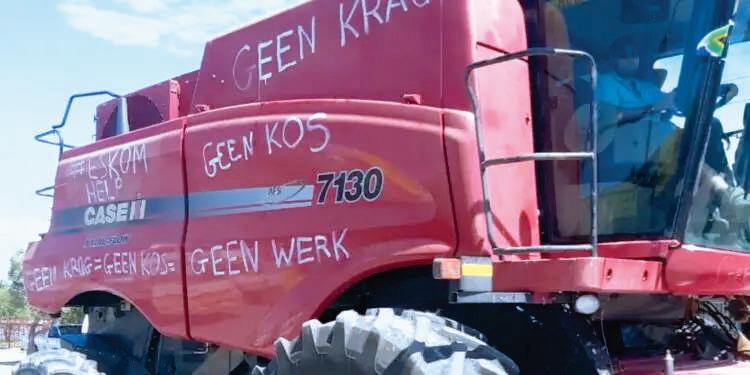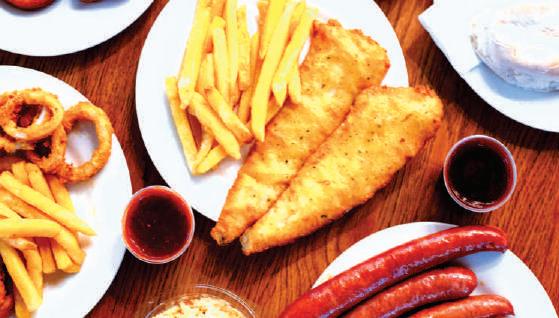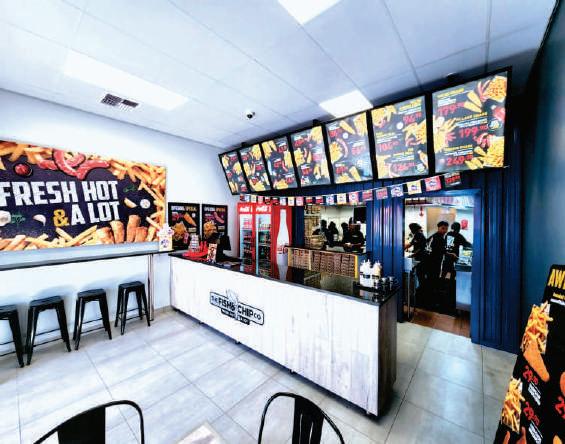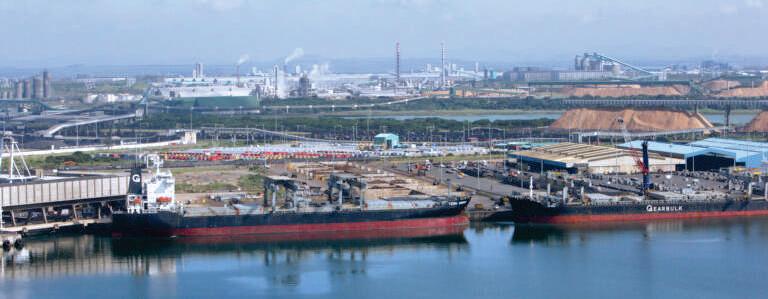
3 minute read
N.Cape Crisis: ‘Help! Our Crops Are Dying’
“Our crops are dying,” warns an award-winning Northern Cape farmer, Gerhard Bruwer, amid nationwide outrage over Eskom’s ongoing power cuts. “They are dying in front of our eyes. Potatoes, corn, peanuts, everything is dying.”
Bruwer, of the Douglas-based Genadeshoop Boerdery, was among the producers, farmworkers, and frustrated residents from Douglas, Prieska, and Hopetown who took to the streets on Friday to raise awareness of the devastating impact of load shedding.The protest culminated at GWK’s offices in Douglas with many farmers arriving in tractors.
Advertisement
The formerToyota andAgri SA Young Farmer of theYear winner farms alongside his father in an irrigation area. For them, load shedding has become a nightmare, he says. “To irrigate, we have electricity for 14 hours of the day. For the [remaining] 10 hours, everything stands still because [there’s no] electricity.”
He emphasises that without proper irrigation, high temperatures experienced in the region over the past few weeks, made matters worse.
Bruwer says farmers have made recommendations to Eskom in a desperate attempt to safeguard food production.

“We suggested that, for example, when it’s load shedding level 4, they instead give [farming areas] level 2 [during the growing season]. From May to July, they can give us level 4 and the rest of the country level 2 because by then we [only need to] harvest.”
According to Bruwer, they have not heard back from the crumbling power utility
Eskom meets withAgri SA, Grain SA
Earlier this week,Agri SAand Grain SAmet with Eskom chief operations officer Jan Oberholzer to discuss the impact of power cuts on farmers and also proposed several recommendations.
Oberholzer confirmed that load shedding would be a reality for the unforeseeable future. Stage 4 will be implemented more frequently as a result of unforeseen breakages at various plants and planned maintenance work, according to a media release issued byAgri SAand Grain SA.

To this effect,Agri SAalso recommended a “trade-off on load shedding schedules.” It says, “Farmers in certain areas are willing to take higher stages of load shedding during the months ofApril, May, an June 2023 on condition that there is sufficient electricity available in the critical irrigation months between January andApril 2023.”
Agri SAalso proposed an alternative tariff structure to the current Ruraflex tariff to ensure that farmers are not unfairly burdened with paying higher electricity tariffs when irrigating during peak times.
“Currently, the winter peak tariff is costing R4 per unit more due to the penalty factor that is incorporated in the tariff,” explains Agri SA.
It also suggests allowing more offgrid and grid renewable electricity generation systems to feed surplus energy back into Eskom’s grid.This, however, must be accompanied with provisions to finalise buy-back tariffs, the farmers’organisation emphasises.
Vrydag 27 Januarie 2023
Inventory and working capital build was in evidence at South32’s SouthAfrican operations owing to logistical problems at the country’s ports operated by state-owned company,Transnet.

The Perth- and Johannesburglisted miner said in a second quarter and half-year production update today there had been a $100m build in working capital as a result of an increase in inventories, mostly from its South African operations.
“This impact is most acute in our aluminium value chain in southernAfrica due to ongoing shipping delays,” the firm said in notes to its production numbers published today.
Aluminium sales from South32’s Hillside aluminium smelter, located in KwaZulu-Natal, increased 8% in the December quarter, but inventory “remained above target levels as two shipments were delayed to January 2023 due to shipping delays at Richards Bay,” South32 said.
Aluminium production from Hillside increased 1% quarter-onquarter despite “elevated loadshedding”. South32 said Hillside was on track for annual aluminium production of 720,000 tons in its 2023 financial year ended June 30.
The group also continued to truck manganese ore from its Northern Cape operations despite road transport being more expensive than rail.The weakness in the rand during the period helped offset the cost, however
Manganese ore production during the six months totalled just over one million tons, an increase of 4% year-on-year The operations were on target for full-year production of two million tons “subject to market conditions and our continued use of higher cost trucking,” South32 said.
Transnet has come in for stinging criticism following a decline in volumes. In December, the Minerals Council called for the resignations of Portia Derby, the company’s CEO and divisional head ofTransnet Freight Rail, Sizekela Mzimela.
Transnet says it is under attrack from rampant crime and sabotage while a lack of spare parts amid an extended dispute with a supplier means that it has low availability of locomotives and rolling stock.The Minerals Council andTransnet subsequently agreed to cooperate to resolve the utility’s difficulties. South32 reported a 12% increase in group copper equivalent production in the first half of the year following the purchase of the Sierra Gorda mine last year and an increase in its stake in Mozal Aluminium, its Mozambqiue operations.
“We continue to reshape our portfolio toward metals critical for a low carbon future, advancing construction work, studies and exploration at our high quality development options,” said Graham Kerr, CEO of South32 in comments to the production report.









